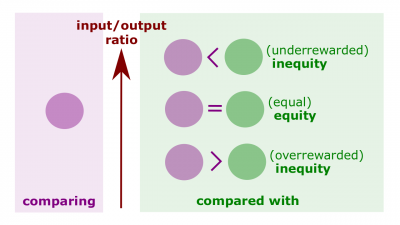Difference between revisions of "Equity theory"
MariamKhalid (talk | contribs) |
|||
| (One intermediate revision by one other user not shown) | |||
| Line 4: | Line 4: | ||
According to [[Organizational Behavior by Robbins and Judge (17th edition)]], | According to [[Organizational Behavior by Robbins and Judge (17th edition)]], | ||
:[[Equity theory]]. A theory that says that individuals compare their job inputs and outcomes with those of others and then respond to eliminate any inequities. | :[[Equity theory]]. A theory that says that individuals compare their job inputs and outcomes with those of others and then respond to eliminate any inequities. | ||
| + | According to [[Management by Robbins and Coulter (14th edition)]], | ||
| + | :[[Equity theory]]. The theory that an employee compares her or his job's input-outcomes ratio with that of relevant others and then corrects any inequity. | ||
| − | ==Related | + | |
| + | ==Related lectures== | ||
*[[Human Motivations Quarter]]. | *[[Human Motivations Quarter]]. | ||
| − | [[Category: Septem Artes Administrativi]][[Category: Articles]] | + | [[Category:Management]][[Category: Septem Artes Administrativi]][[Category: Articles]] |
Latest revision as of 15:29, 3 June 2020
Equity theory (hereinafter, the Theory) is the theory that an employee compares her or his job's input-outcomes ratio with that of relevant others and then corrects any inequity.
Definitions
According to Organizational Behavior by Robbins and Judge (17th edition),
- Equity theory. A theory that says that individuals compare their job inputs and outcomes with those of others and then respond to eliminate any inequities.
According to Management by Robbins and Coulter (14th edition),
- Equity theory. The theory that an employee compares her or his job's input-outcomes ratio with that of relevant others and then corrects any inequity.
